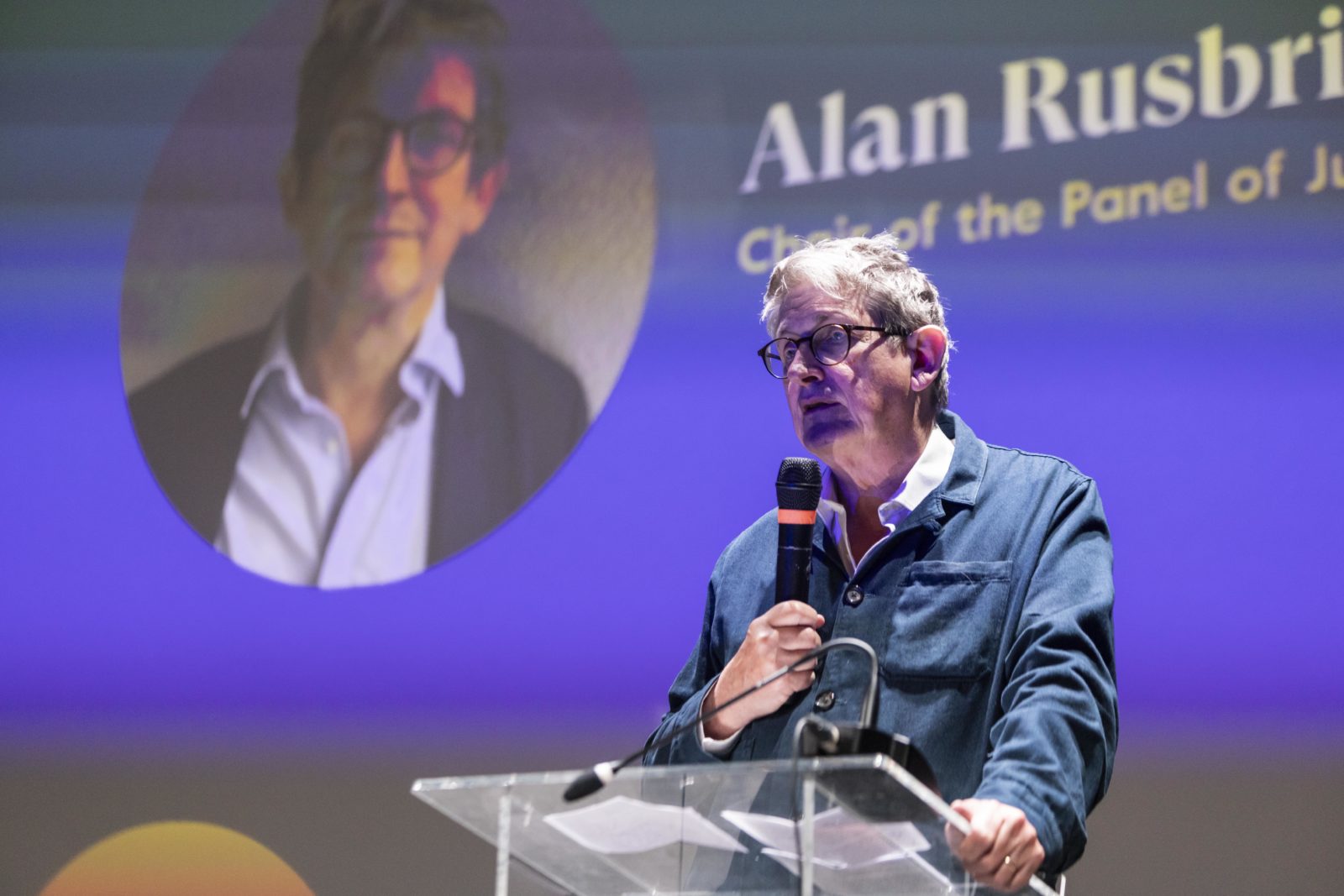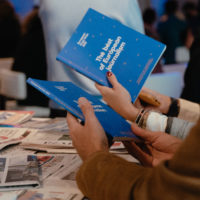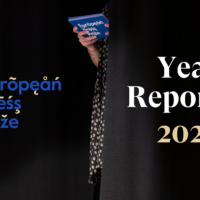“Lies have as much currency as truth, if not more.” – Alan Rusbridger on the media today
Ahead of the 2025 European Press Prize Award Ceremony, we spoke to Alan Rusbridger about the state of independent media in Europe, the changing landscape for journalism today, and how he envisages the future of the industry.

Photo: Antonio Pellegrino / @phantoniopellegrino
What is the most significant change you have seen to the media industry in your time as a journalist or editor?
The overwhelming change has been to the role of the gatekeeper. I was a gatekeeper but that role has been dispersed. Obviously, the thing that happened in the second wave of the internet – around about 2007 to 2008 – is that billions of people had the ability to publish, to discuss, to challenge, and to create content.
We all thought that the internet was dramatic – the most dramatic thing to happen in 500 years – but then five years later the second wave came along. I think that anyone who pretends that we fully understand the implications or the consequences of that is fooling themselves. We’re still living with it.
How has that changed the relationship between the audience and the journalist?
I’m old enough that when I started editing in 1995, you more or less had to come to us to be informed. In Britain, there were eight national daily UK newspapers, plus the BBC and one or two commercial radio stations. The funnel of information came through a very tight nozzle. It was really difficult to find out things independently from what we were telling you. For right or wrong – and there was lots wrong with that – it did create a kind of filter. When it worked, it did manage to sift out things that were false. So it had its merits but it wasn’t all wonderful.
It’s been replaced now by a system in which literally billions of people can speak, can test things, and can spread information, disinformation, or – with AI – entirely invented things. There are good things about that, there are voices that were never heard before, there are points of view that deserve to be heard. People can make connections that they could never make before. But along with that, we’re living in a world in which people can be manipulated.
Lies have as much currency as truth, if not more. Bad players can exploit this and it’s a mess. Some celebrate that mess, some think we’ve lost a great deal. Journalism has been diluted and it’s been challenged, legitimately and illegitimately.
I think journalism is struggling to work out how to get itself back into the conversation.
What would you say is the biggest challenge to journalism as it tries to get itself back into that conversation today?
Well, on a kind of meta level, I think there’s a problem in that all we have is a craft. Our story to the public is that we have this toolkit. You should read, watch, and listen to us because we can give you the truth – all because of this toolkit that we have.
The problem is we can’t really agree what that toolkit is. The New York Times toolkit is very different from the Fox News toolkit. The BBC toolkit is very different from The Daily Mail toolkit. I think the public has sort of grasped that. You can believe in objectivity, you can believe in subjectivity or the separation of news from comment.
There are many reasons for the pretty low levels of trust in the media but I think that’s one of the critical ones: we haven’t really convinced the public that this craft that we have is one that is universally to be trusted.
How could that happen?
Well, you can take this wide lens and say that in 200 years of history, the ownership question clearly matters. 200 years ago, people owned newspapers in order to promote political parties. That ownership question still comes right down to today with figures like Rubert Murdoch and figures to the right of Rupert Murdoch. That’s one thing.
The second thing is that the gatekeeper generation never really had this question of trust. We could see that the levels of trust were going down and down and never did anything about it. I think it’s time that we face up to the fact that we do have a problem with trust and we have to begin some pretty basic measures to try and win that trust back.
You spoke about objectivity and the difference between news and comment. If you look at countries where press freedom is in decline, along with other civil liberties, a lot of journalists are forced to report on the collapse of democratic institutions that also shrinks the space for them to actually do their work. It can lead to a blurring of the lines between journalism as we know it and activism. What’s your take on that? Is it a threat to traditional journalism or just another era for it?
I think these are different things, journalism and activism. They do blur in some people’s mind and I think the experience of some editors today – even where there isn’t a repressive atmosphere for journalism – is that the younger generation of people coming into journalism now are as interested in being activists as journalists.
It’s understandable and you can think of subjects where it’s more justifiable than in others; something like climate change. The 23-year-old journalist who thinks “this is so urgent. We’ve got to go beyond just reporting it in a way that the public doesn’t seem to be absorbing or realising the urgency there. So we should go that extra step.” I think if you do believe that, you might want to go work for an organisation like Greenpeace which has a great investigative unit and does sort of journalistic adjacent stuff.
I think it’s quite dangerous. Climate change is an outlier, because the science of it is now so universally accepted, there shouldn’t be much of an argument. But on most subjects, it’s not that clear-cut and one of the bits of the toolkit is that journalism has to be independent from all forms of power. The moment you start sacrificing that independence in order to achieve ends, it stops being classical journalism. At the time when we’re trying to persuade people that there is such a thing as journalism that is valuable and necessary, that’s quite dangerous.
Would that go down to journalism education, that you’re trying to change the perspective of what journalism is to younger people coming through, who might have more of a passion for activism?
I think you have to persuade them. I recently interviewed Joe Kahn, the Editor of the New York Times, and I asked him about Marty Baron, the Editor of the Washington Post, who in his recent autobiography talks about this big generational divide. I think Marty felt worn down by it and Joe’s answer was that you do have to imbue in people what the New York Times’ approach to journalism is and people had to buy into that in order for the brand of the New York Times to be clearly understood, which I think it is, it’s a very strong paper.
So there is an important role for journalism schools in agreeing what that toolkit is. Add in persuading the 21-year-olds, the 20-year-olds, that there are really important roles to play in activism but it’s not necessarily the same as journalism.
How would you view the role of organisations like the European Press Prize and other CSOs in these border conversations?
Well, for me, there is so much denigration of the press and we know that financially, economically, and in lots of other ways – with repressive regimes for instance – it’s always the press that cops it first. So it’s quite a gloomy time. It’s easy to get gloomy about the press. I’ve been chairing the Panel of Judges for five years now and I come away feeling tremendously optimistic about that. It is true that there is this narrative about the press but there’s a counter-narrative too and that’s in the work that amazing journalists are doing, which is bold, challenging, fact-based, brilliant technically – whether that’s visually or in the use of data or photography or a combination of all of those – brilliant storytelling, and words, often in the face of remarkable threats. I think it’s really important that there is somebody celebrating and holding this work up and saying “this is the best work there is” so that people want to be journalists, they aspire to do that pinnacle of that work. So that’s why I think anything that celebrates the best in journalism is really important.
If you look at journalism today in its current form, do you think it can exist as it does now in, say, 10 years or 15 years?
Well, it does seem that people continue to want to be journalists. Sometimes surprisingly. There are many reasons not to want to be a journalist but I think that tells us that it is a kind of vocation. Nobody who wants a secure life or to be immensely wealthy is necessarily going to go into journalism these days. But I think there’s a human instinct to want to uncover truths, to tell stories, to challenge power, to point out things that are wrong. That’s a very human instinct. I think that will always be there.
I imagine that in 10 years there are going to be as many challenges to what we do as there are now, if not more. But I think it will continue to exist, and in some places to flourish. There may be fewer places where it flourishes but I think in the places that it does, it will attract support and financing.
So that’s looking at journalism as a vocation, and that people will always want to be journalists, but people don’t necessarily always seem to want to consume journalism or interact with it.
Well, I don’t know about that. For all that we sneer at legacy media, if you imagine it gone – and of course, in some places, it has gone – I think people will then really notice. I think it’s quite striking how, when a reasonably sized local paper dies or is dying, you see these little green shoots appearing. People’s instincts are to start something else. I think, for instance, if Trump or Orbán could wave a magic wand and just disappear journalism, people would realise that there is something profoundly missing.
There’s a degree of complacency at the moment about what we’ve got. We probably don’t value and cherish it enough, but I’m not so gloomy as to believe that people don’t want to be informed.
Alan Rusbridger has served as the Chair of the Panel of Judges at the European Press Prize for the past five years. He is a British journalist, Principal at Lady Margaret Hall Oxford, and Chair at Reuters Institute for the Study of Journalism. He served as Editor-in-Chief of The Guardian from 1995 to 2015.





